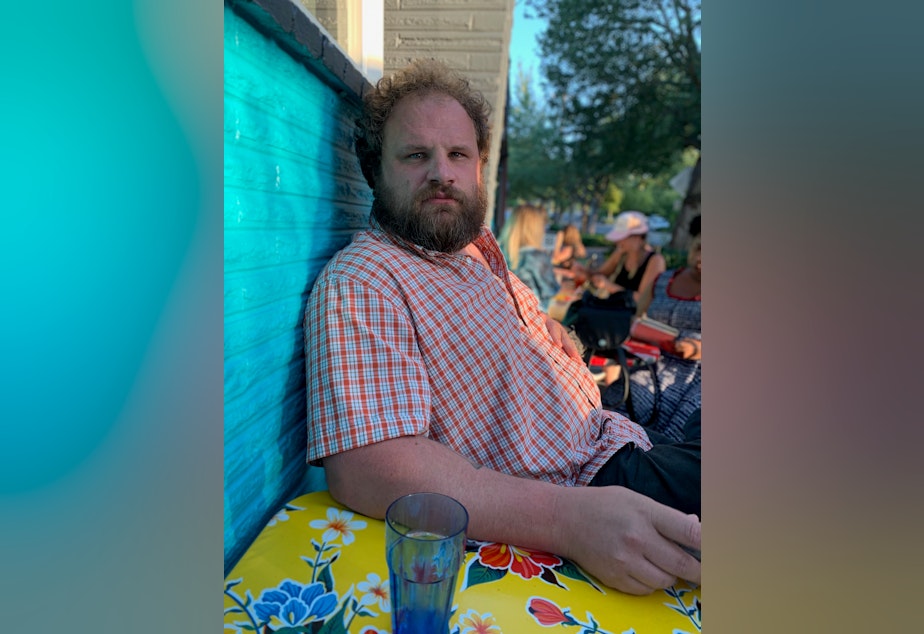Eleven years sober, this stand-up comedian now helps teens in recovery

Sam Miller is a six-foot-six, 360-pound stand-up comedian. When you give him a handshake, his hand completely envelopes yours.
Sam's larger-than-life presence isn't the only thing that sets him apart on stage.
In his comedy, he talks about his experiences with drug and alcohol addiction, incarceration and homelessness. Offstage, Sam works with young people struggling with those same issues.
In Sam's work as a restorative justice practitioner, he draws on experiences he had when he was young.
His dad died when he was twelve years old, and he started doing drugs at age fourteen. That's when things got "really bad, and then they kept escalating," Sam told me.
When Sam was a sophomore, he got caught with marijuana at school. He was arrested and handcuffed in front of his entire class.
"They took me to the office," he said, "and in the office was a cop and the vice principal, and I kept doing the tough guy thing."
Sam sat on one side of the office desk. The officer and vice principal sat on the other side.
Sponsored
Sam tried to keep a brave face, but then his mom came, and she joined them on their side.
"And then I just fell apart," he said.
He was alone.
"It was like, okay, here we go," he said. "It's war."
"That kicked off another nine years of constant substance abuse and incarceration."
Sponsored
Sam doesn't want that for other young people.
Now eleven years sober, he works in schools and facilitates support groups for teenagers who are in recovery and struggling in school.
"The best I can do is to build community up amongst young people," he said.
His work is informed by restorative justice, a set of practices that involve the whole community in managing conflict.
The idea is that when students feel connected to their school community, they want to be there, and the number of suspensions goes down.
Sponsored
According to the ACLU, students who are suspended are three times more likely to drop out or come in contact with the juvenile justice system within the next year.
Kayci Guiberson is a student in one of Sam’s support groups at Henderson Bay High School, an alternative school in Gig Harbor that's starting to implement some restorative justice practices.
When Kayci first came to Henderson, she got caught skipping class. She says at her old school, she probably would’ve gotten in-school suspension. But at Henderson, the principal invited her into his office for a conversation.
“He even told me, ‘I can’t really expect you to always be on your target game,’” Kayci said. “That was the last skip day for me.”
Kayci says the adults at Henderson treated her with respect and care. Teachers would check in with her if they thought she looked tired or upset.
Sponsored
At one point, Kayci wasn’t living with her family. She remembers Sam giving her resources and helping her stay sober.
“Sam gave me his eight-year sober coin,” she said. “He passed it along and said that it would be some good vibrations for my sobriety.”
That’s what restorative justice is all about: creating a culture that says 'we’re in this together.'
But there are a few bumps in the road.
Fully implementing restorative justice requires a big commitment of time, money and staff. Every staff member needs to be trained. And since a lot of teachers already feel maxed out, it helps to have a full-time restorative coordinator to guide the school through the transition.
Sponsored
Even so, Sam says that restorative justice is the best way to support students.
“Restorative justice is evidence-based now,” Sam said. “This isn’t some pie-in-the-sky, hippie-dippie dream that somebody had. This is real, and it’s working.”
Changing a school’s culture doesn’t happen overnight, but even small steps — like creating support groups, purposefully building relationships with students and holding meetings in circles — can make a difference.
This story was created in KUOW's RadioActive Intro to Journalism Workshop for 15- to 18-year-olds, with production support from Kelsey Kupferer. Edited by Ruby de Luna.
Find RadioActive on Facebook, Twitter and Instagram, and on the RadioActive podcast.
Support for KUOW's RadioActive comes from the Bill & Melinda Gates Foundation Discovery Center.



